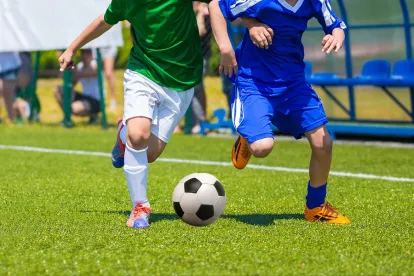Football’s handball law has been under scrutiny from pundits, players and fans alike for some years now. Last year, Sports Shorts assessed the controversy of the new handball law, which has continued to depend on interpretation with little uniformity in its application across world football.
The International Football Association Board (“IFAB”) has since stepped in. The Premier League issued new guidance on the handball law ahead of the 2020/21 season. The new guidance included the following considerations:
-
the boundary between the shoulder and the arm is designed as the “bottom of the armpit” and a player shall be penalised for handball where the referee has “clear evidence” that the ball has struck the player’s arm below the bottom of the armpit;
-
incidents where the ball hits the shoulder shall not be penalised;
-
a player cannot score a goal with their arm, even if it is accidental;
-
an accidental handball by an attacking player will only be penalised if it occurs immediately before a goal or a goal scoring opportunity;
-
if an attacking player accidentally touches the ball with their hand/arm and then scores, or the ball goes to another attacking player and they immediately score, there is a handball offence;
-
it is not handball if, after an accidental handball, the ball travels some distance or there are several passes before the goal or goal scoring opportunity.
The guidance states that an accidental handball shall only be penalised against an attacking player if it leads to a goal scoring opportunity or where the attacking player scores a goal.
Law 12 of the IFAB’s Laws of the Game covers handballs. The IFAB has now clarified that it is a handball if a player:
-
deliberately touches the ball with their hand/arm;
-
touches the ball with their hand/arm when it has made their body unnaturally bigger;
-
scores in the opponent’s goal directly from their hand/arm or immediately after the ball has touched their hand/arm, even if accidental.
The IFAB has also indicated that it is no longer an offence where there is an accidental handball that leads to a teammate scoring a goal or having a goal-scoring opportunity.
There are two key changes here. The first is that accidental handballs that lead to a teammate scoring or having a goal-scoring opportunity shall no longer constitute a handball offence. This means that Fulham’s recently disallowed goal against Tottenham – where Josh Maja’s goal was ruled out after a handball in the build-up of play by Mario Lemina – would not be ruled out next season.
The second key change is that a defender will only be penalised for handball if the position of their arm is not a consequence of the player’s body movement for that specific situation. For example, if a defender lunges to try to block an attacking player’s cross, the position of the arm may be naturally elevated in light of the lunging motion. In this case, a referee may now consider the arm to be in a natural position and thus no handball. This means that not every touch of a player’s hand or arm will be a handball offence. However, the IFAB has stated that such position does run the risk of the player being penalised.
IFAB’s technical director provides some insight behind the rule change: “handball is always going to be a journey to an ideal but we’ll never get there because it’s a subjective area. And we have to accept that. That is why applying the spirit is the most important aspect of the law… People have said that the current wording is far too rigid and inflexible. What we’re basically doing is reflecting in the wording exactly what football commentators and football people say, which is referees must continue to take account of the player’s arm position relative to what that player is doing and how that player is moving for that particular moment in the game. That is the over-riding principle.”
The football community should welcome such rule change, which somewhat removes the overriding strict liability for handball offences that was being applied to the game.




 />i
/>i

